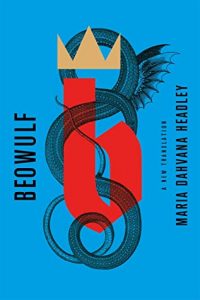BEOWULF: A New Translation by Maria Dahvana Headley (BOOK REVIEW)
 So. Here’s the thing about Beowulf. A lot of people have bad high school memories of reading an archaic, basic myth about a dude whose sole defining feature was that he loved punching monsters, a story filled with long and pointless asides about historical cultures and figures that you aren’t equipped to pronounce, let alone understand. Part of the reason for that impression is that it’s an epic poem translated from Old English, and that’s two layers of obfuscation. When you’re struggling just to parse the sentences, you’re not going to absorb much about the story beyond the basic plot.
So. Here’s the thing about Beowulf. A lot of people have bad high school memories of reading an archaic, basic myth about a dude whose sole defining feature was that he loved punching monsters, a story filled with long and pointless asides about historical cultures and figures that you aren’t equipped to pronounce, let alone understand. Part of the reason for that impression is that it’s an epic poem translated from Old English, and that’s two layers of obfuscation. When you’re struggling just to parse the sentences, you’re not going to absorb much about the story beyond the basic plot.
I’m not here to throw shade at other translations. I’ve read one of the more prominent ones and liked the story. It’s a tale about rulers wanting to make their mark on history, and a rumination on the social contract between the ruling class and their subjects. Beowulf himself is driven by this constant need to prove himself. He’s not hunting monsters out of a sense of heroism, duty, or even revenge. He needs the world to know that Beowulf is the best that ever was. It’s not enough for him to fight Grendel, a monster that has terrorized a kingdom for 12 years. He does it unarmed and without armor. It’s not enough that he fights a dragon as an old man. He engages her alone. Even when he is lauded as a good king who provided wealth and peace to his subjects, Beowulf just can’t stop trying to prove that he’s the man.
There are a few things that hold back translations. Some want the story to feel archaic, to pay tribute to its status as the most famous work of Old English, so they only translated it up to 16th Century English. Others focus more on keeping the poetry intact. Either method can make the book unapproachable, but what if I told you that we now have a translation that brings the story to contemporary, casual English while hanging on to the form of Old English Poetry?
That’s what Maria Dahvana Headley gave us with Beowulf: A New Translation. Her translation uses contemporary English, making use of slang and profanity to make sure the flavor of the text comes through. It’s a boisterous, joyful retelling, though I’m a little mixed on some details the implementation. It works about 90% of the time, but I worry that the use of “bro,” “bling,” and the like will date this translation and reduce its value in the future. For the most part, to this modern reader, it makes the tone and story apparent in a way that no translation has before. For example, the flyting between the Virgin Umberth and the Chad Beowulf comes across with more bite than past versions; there’s no room to misunderstand that it’s a contest of ritualized shit-talking. Throughout, the plot is clear and the themes shine through.
On top of that, Headley brings her own poetry, with alliteration that pays homage to the original style of poetry, complex rhymes, and delightful turns of phrase that make me wonder why they didn’t hire a rapper for the audiobook. Check out some examples below.
“Under a new moon, Grendel set outto see what horde haunted this hall.
He found the Ring-Danes drunk,
douse-downed, making beds of benches.
They were mead-medicated, untroubled
by pain, their sleep untainted by sorrow.
Grendel hurt, and so he hunted. This stranger
taught the Danes about time. He struck, seized
thirty dreaming men, and hied himself home,
bludgeoning his burden as he bounded, for the Danes
had slept sweetly in a world that had woken him,
benefited from bounty, even as they’d broken him.”
“Bro, it was easy
after that to count the weepers: men fleeing to cotes
beneath the king’s wings. You’d have to have been a fool to miss
the malice of the Hell-dweller, now hall-dwelling. Those who lived, left
or locked themselves in ladies’ lodgings, far from fault lines.
Those who stayed? Slain.”
“The grasp began the tear that would take Grendel out, rendering him
a revenant in the hall he’d always reveled in.”
Headley brings a directness, intensity, and rhythm to her translation that I haven’t seen before. This is what it must have felt like to sit in a mead hall and listen to a scop tell the tale. Other translations may be more scholarly, literal, or true to the poetic form of the original, but it’s been a thousand years since Beowulf was this accessible or exciting.

